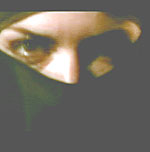2007年VOA标准英语-Religious Tolerance Facing Test in Britain(在线收听)
London
10 August 2007
Religious tolerance in Britain is getting put to the test, following two attempted car bombings earlier this summer. All the suspects are Muslims. A separate protest movement by young Muslim women only adds to increased tensions between many Britons and minority Muslims. Mandy Clark explains.
 |
Christopher Doyle, from the Council of British-Arab Understanding, says it is neither. “Increasingly in communities, not just in Britain -- in Europe, in the Middle East and elsewhere -- they feel that Islam is under threat and being demeaned particularly in the West. They wear it actually to say, 'I'm proud of being a Muslim.’ “
Britain's Office of National Statistics says there are about two million Muslims living in Britain, making Islam the country's second-most popular faith.
The Muslim Council of Britain says the community has come under growing scrutiny since the 2005 London terrorist bombings and attempted terror attacks this summer in Glasgow and London.
British politicians have gone on the offensive. The justice minister calls the niqab "a barrier to communication," and former Prime Minister Tony Blair, "a mark of separation." In March, the government gave local school administrators the authority to ban students from wearing full-face Muslim veils.
The London think-tank Policy Exchange says an increasing number of Muslims see it as a statement, showing their opposition to government policies, particularly the war in Iraq.
Mahjabeen Khan started wearing the niqab in university. She says more and more Muslim women are reaching for the veil. "Since the terror attacks in America and in the U.K., I think a lot of people have embraced wearing the hijab and the niqab because they are proud to say they are Muslims."
And it is largely young women who are choosing to cover themselves, says veil vendor, Yasmin Salaam. "Such negativity that you get from a lot of people, for example the media, it does encourage a lot more unity amongst young people to actually do the opposite, to put the veil on and the niqab, and to actually make a statement."
But not all Muslims support the trend. Author and poet Shusha Guppy says it sickens her. "I would like to go to those girls and say this is not a symbol of difference or identity, it is simply a symbol of oppression. The generations of my mother fought with their lives to get rid of this dreadful symbol, and you want to put it back on voluntarily? It's insane, it's giving ammunition to the enemies of Islam."
Another Muslim woman, Shah Rokh Hussein, agrees. She says the veil is not a symbol of her faith. "What I do disapprove of is sometimes very aggressive militant groups present it as something that is very much part of the religion of Islam, when it actually isn't. "
The wide diversity of Muslim followers means the different sects of Islam often do not see eye to eye. The Muslim Council of Britain says education and dialogue are needed to not only promote understanding between the various Islamic groups but also to repair relations with the non-Muslim community. And it says that until that happens, there will be suspicion on all sides.